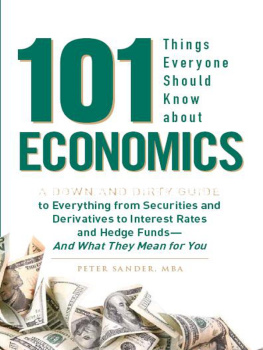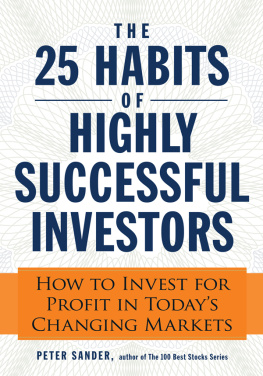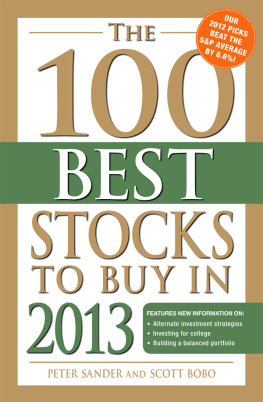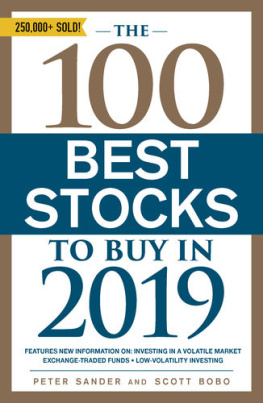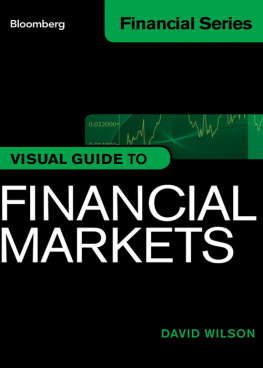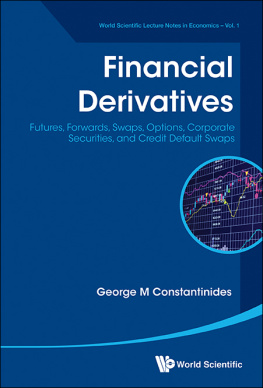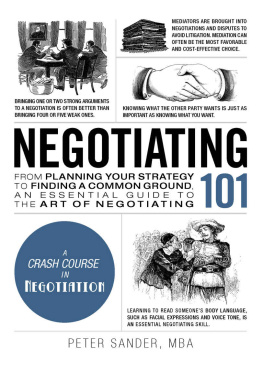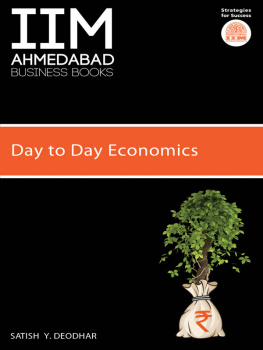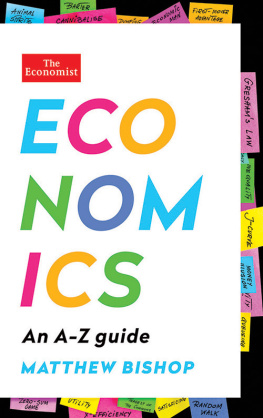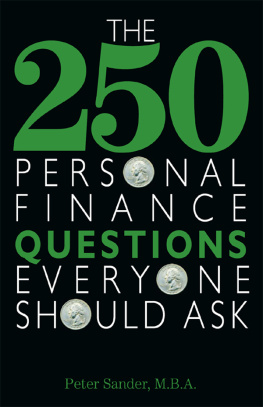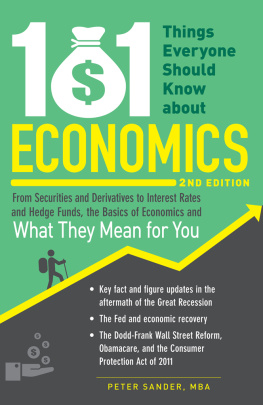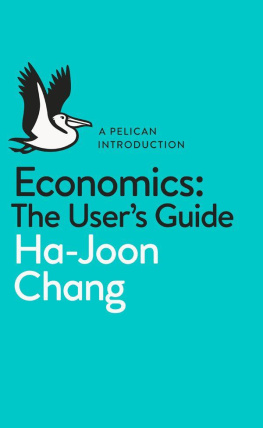
101 Things
Everyone
Should
Know
about
ECONOMICS
to Everything from Securities and
Derivatives to Interest Rates
and Hedge Funds
And What They Mean for You
PETER SANDER, MBA

Copyright 2009 by F+W Media, Inc.
All rights reserved.
This book, or parts thereof, may not be reproduced in any form without permission from the publisher; exceptions are made for brief excerpts used in published reviews.
Published by Adams Business, an imprint of
Adams Media, a division of F+W Media, Inc.
57 Littlefield Street, Avon, MA 02322. U.S.A.
www.adamsmedia.com
ISBN 10: 1-4405-0350-8
ISBN 13: 978-1-4405-0350-4
eISBN: 978-1-4405-1343-5
Printed in the United States of America.
J I H G F E D C B A
Library of Congress Cataloging-in-Publication Data
is available from the publisher.
This publication is designed to provide accurate and authoritative information with regard to the subject matter covered. It is sold with the understanding that the publisher is not engaged in rendering legal, accounting, or other professional advice. If legal advice or other expert assistance is required, the services of a competent professional person should be sought.
From a Declaration of Principles jointly adopted by a Committee of the American Bar Association and a Committee of Publishers and Associations
Many of the designations used by manufacturers and sellers to distinguish their product are claimed as trademarks. Where those designations appear in this book and Adams Media was aware of a trademark claim, the designations have been printed with initial capital letters.
This book is available at quantity discounts for bulk purchases.
For information, please call 1-800-289-0963.
Contents
CHAPTER 1
The Basics
CHAPTER 2
Economy and
Economic Cycles
15. THE WEALTH EFFECT
CHAPTER 3
Money, Prices,
and Interest Rates
CHAPTER 4
Banks and Central Banking
CHAPTER 5
Governments and
government Programs
CHAPTER 6
Economic Schools
and Tools
CHAPTER 7
Finance and
Financial Markets
82. BROKERS, BROKER DEALERS, AND
REGISTERED INVESTMENT ADVISERS
CHAPTER 8
Trade and
International Economics
Introduction
What is the world coming to?
You read the headlines. Two appeared recently on the front page of the same newspaper (for those of you who still read newspapers):
Public Wary of Deficit, Economic Intervention
Historic Overhaul of Finance Rules
The public is wary of the deficit and economic intervention? Im part of the public, so I guess I had better be wary, too. And a big change in the rules? Better keep up with that one, too. I earn, save, borrow, spend, and invest money, so Id better find out about any changes in the rules.
Truth is, headlines like this have become part of daily life. Sure, a few years ago, headlines about GDP growth or trade deficits or interest rates were mostly background noise, to be ignored unless you were an economist. Things were going pretty well. We had money to spend, everything was growing just a little each year, our retirement accounts were growing steadily, our jobs were reasonably safe.
And then it happened.
It is the economic crisis. That big swoon of 20082009 after years of good times. Good times? Not for everyone, but for a lot of us. Our homes earned more than we did. We could borrow money cheaply and almost without any questions asked. We used our homes as ATMs. We could buy anything we wanted, and who cares about the debt, or deficits, or inflation? That was covered too, because home prices and other investment prices were going up. But it all went poof starting in 2007. The speeding locomotive of real estate prices, supported by lax lending, suddenly went into reverse.
And much to our surprise, everything turned out to be connected to everything else. The rest is history. And its a history that will play out for years to come.
Some of you may have taken that boring senior-level econ class in high school. You may have a rudimentary understanding of economics from that or some other class or from an uncle or grandparent who got a kick out of telling you about the Great Depression. You may have learned something along the way about supply and demand. You understood the difference between macroeconomics and microeconomics. You know that a good economy means a strong GDP and low unemployment. You have an idea that when those things are going well, youre more likely to have some spending money in your wallet and that your 401(k) plans will grow at least a bit. You know enough to fear inflation and that someday there will be another recession, who knows when or why. But thats about it.
Now those relatively basic economic concepts have been set upon their ear. The news flashes are about deleveraging, deflation, credit default swaps, asset backed securities, hedge funds and globalization. We have TARP and TALF and Bear Stearns and Lehman Brothers. We have Timothy Geithner and Ben Bernanke and Bernard Madoff and a bunch of angry senators in the Senate Banking Committee. We have Barack Obama making almost daily pronouncements about the best way to fix the economy. Were becoming swept up in a horrifically complex, interconnected, and fast-paced world of change.
Worse, the powers that be at the Federal Reserve, SEC, and elsewhere for many years seemed to have control over things if the economy went a little cool, they could stimulate it back to life; when it ran a little hot, they could cool it. They spoke of the Goldilocks economynot too hot, not too cold. The medicine worked. And everyone expected it to work. However, in the past ten years and especially in the recent crisis the patient has become less responsive to the usual medicine. So whats the good doctor to do? Increase the dosage, naturally. That meant lower interest rates and greater financial stimulus for longer periods of time. Unfortunately, the side effectsthe unintended consequencesinclude a real estate bubble, and many are worried today about catching a deadly inflationary virus as we move forward.
Bottom line: it seems like the more you know, the more you dont know, and since this stuff messes with your future, youd better learn whats going on. So thats why 101 Things Everyone Should Know about Economics comes to the table at just the right time.
This book is not a crash course on economics, although some may decide to use it that way. Most definitely it isnt a textbook. Instead, it is intended to provide a handy reference to the very real concepts and terms in use in todays economy. It connects things you read about and hear about to things you need to know about and do. Or not do. Its more than a study guide for your economic life. It is intended to help you understand how economic concepts affect you. It is intended to help you make sense of what is good for you and bad for you, both now and in the future. It is intended to help you ask the right questions and ultimately take the right actions.
By no means is this book, like so many other books and articles you read, designed to help you get rich or earn more money or even save money. And, very importantly, this guide is not meant to help you understand just
Next page
